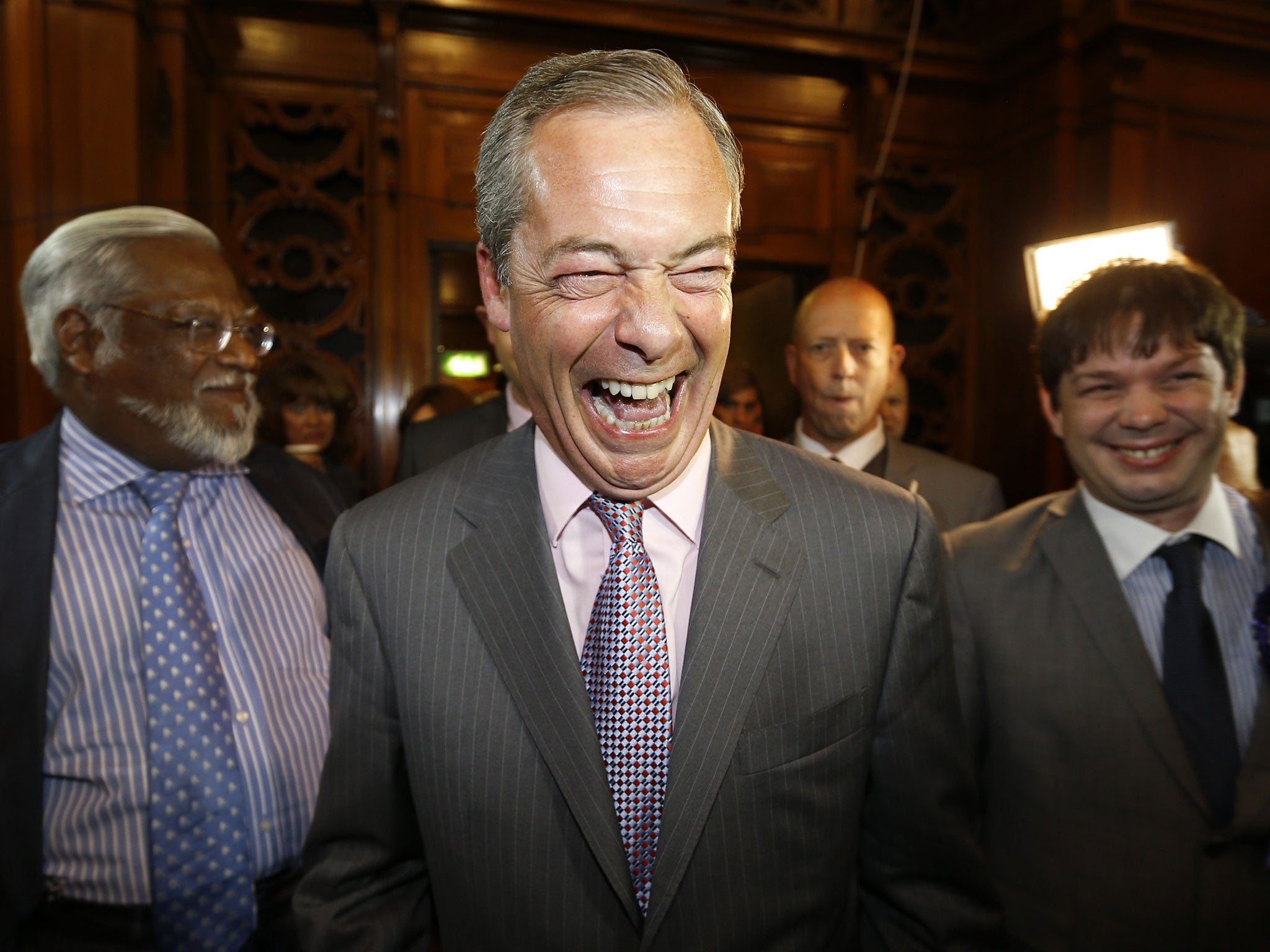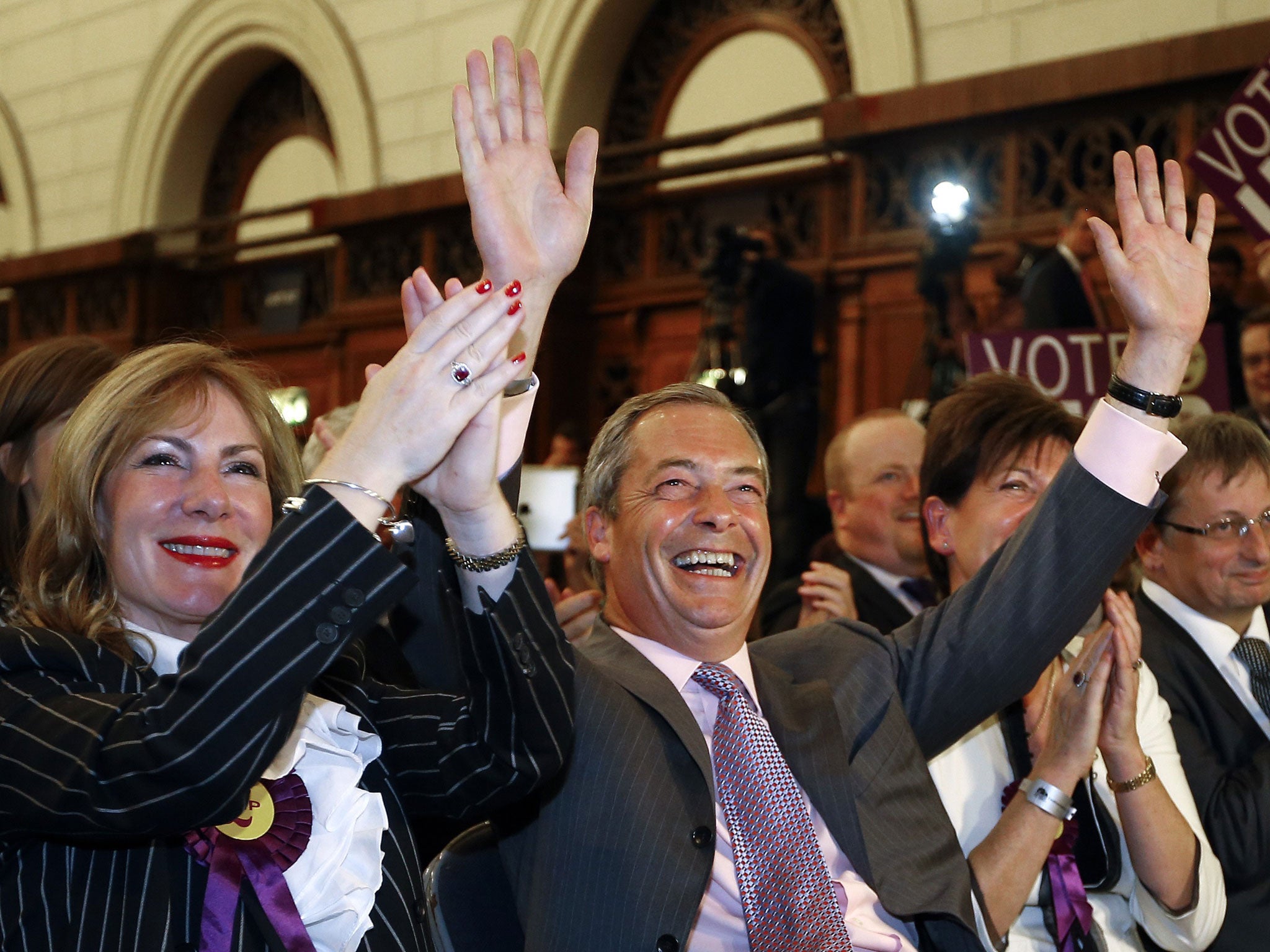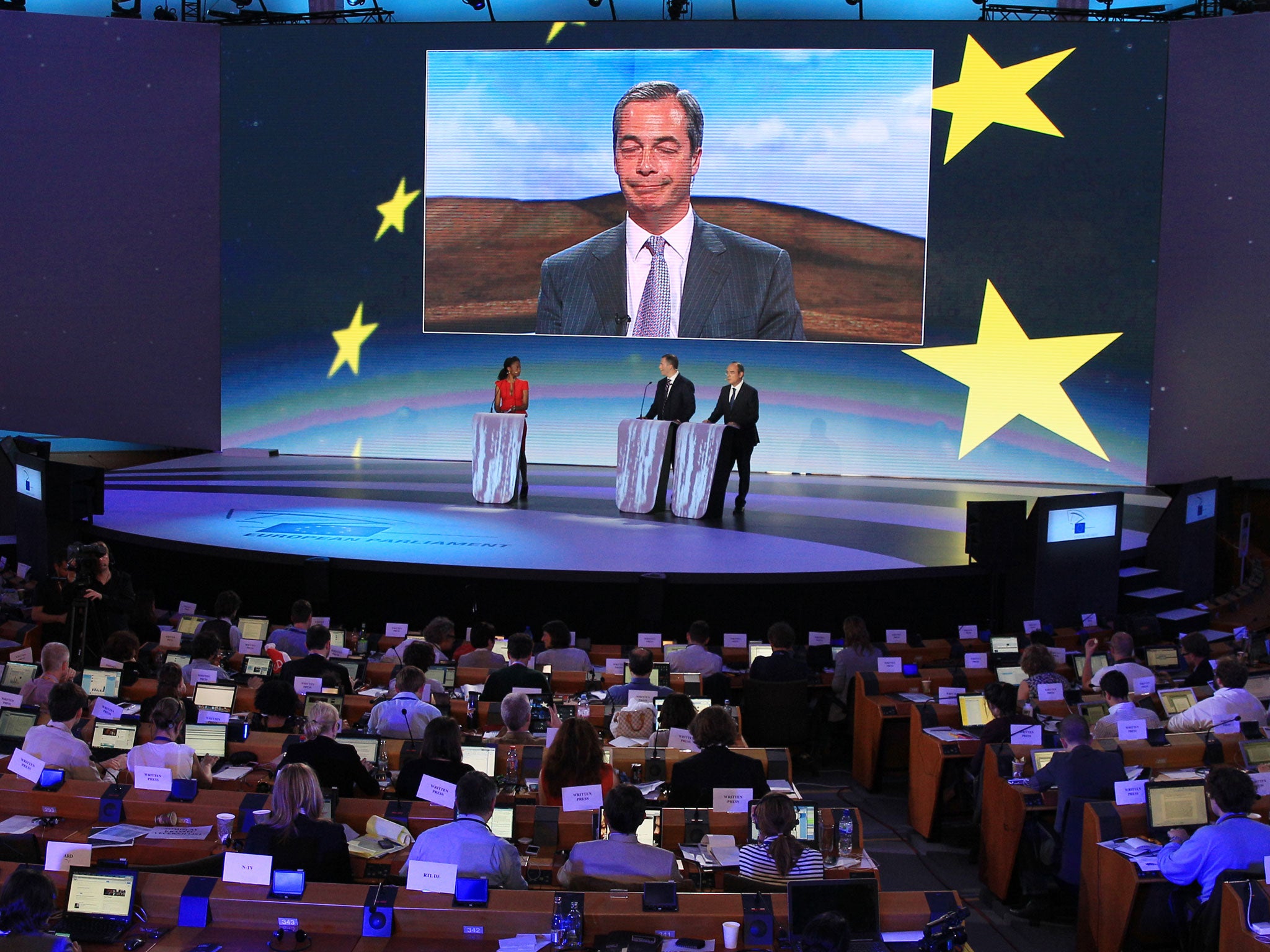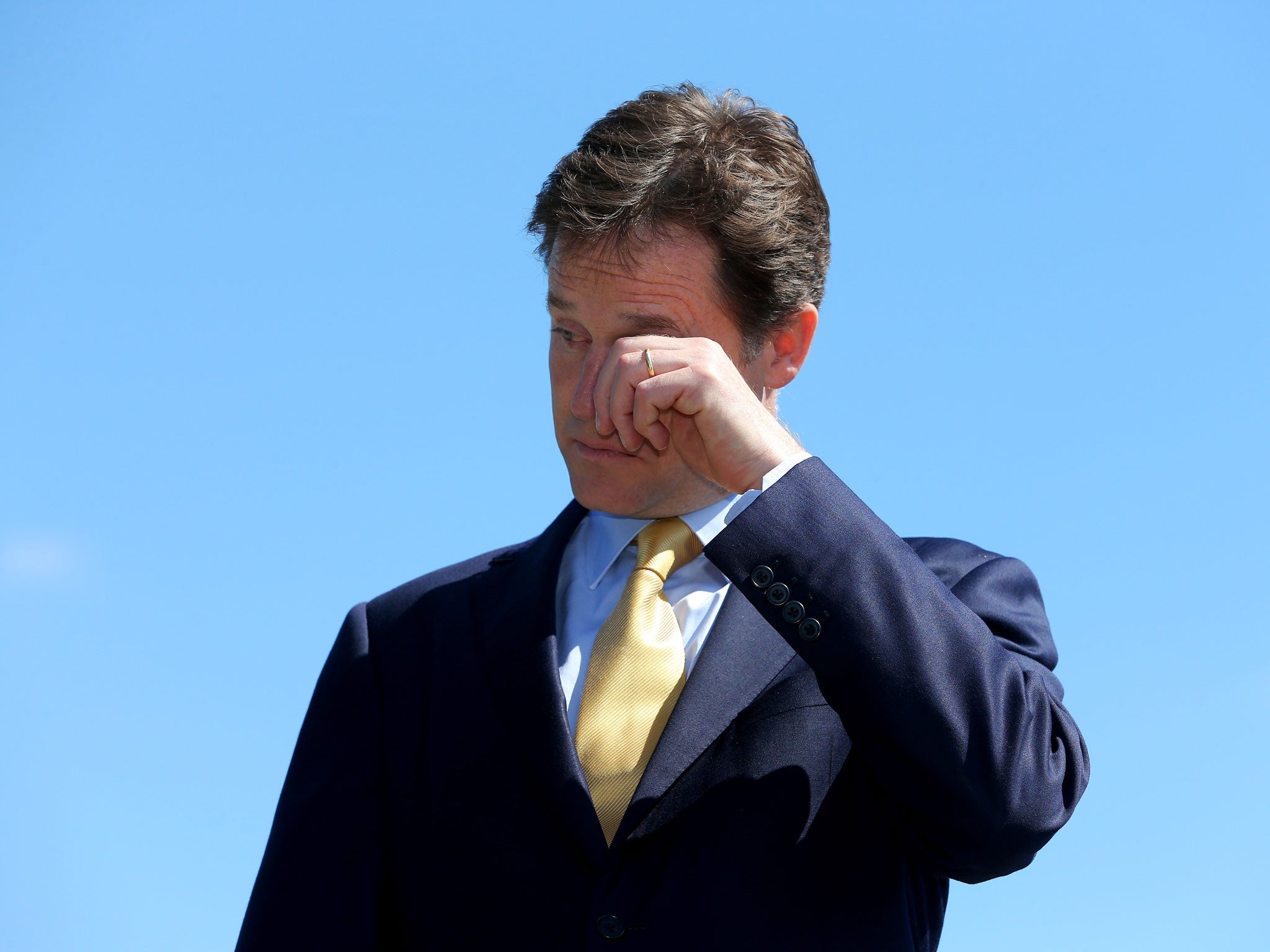European elections results 2014: Farage and Ukip top poll as Europe swings to the right
Ukip beat Labour to first place, with Tories dropping to third for first time ever in a national election

Your support helps us to tell the story
From reproductive rights to climate change to Big Tech, The Independent is on the ground when the story is developing. Whether it's investigating the financials of Elon Musk's pro-Trump PAC or producing our latest documentary, 'The A Word', which shines a light on the American women fighting for reproductive rights, we know how important it is to parse out the facts from the messaging.
At such a critical moment in US history, we need reporters on the ground. Your donation allows us to keep sending journalists to speak to both sides of the story.
The Independent is trusted by Americans across the entire political spectrum. And unlike many other quality news outlets, we choose not to lock Americans out of our reporting and analysis with paywalls. We believe quality journalism should be available to everyone, paid for by those who can afford it.
Your support makes all the difference.Nigel Farage inflicted another body blow on the three main political parties on Sunday night as Ukip scored a stunning victory in the European Parliament elections.
The anti-EU party dramatically built on its success in the local elections in England last Thursday when the results of the Euro poll on the same day were announced. A jubilant Mr Farage hailed the outcome as “an earthquake” because “never before in the history of British politics has a party seen to be an insurgent party ever topped the polls in a national election”.
The Conservatives, Labour and Liberal Democrats conceded that Ukip had come first, with just Northern Ireland left to declare on Monday afternoon.
At 12.30pm it was confirmed that Ukip had taken its first ever Scottish seat, taking the party's total to 24 - almost double the 13 seats it won in the last Euro elections in 2009. The result from Scotland was delayed because the Western Isles local authority does not count votes on a Sunday.
The Tories, who came first last time with 25 seats, have suffered the humiliation of dropping to third place for the first time ever in a national election. They secured just under 24 per cent of the vote, losing six seats.
Labour claimed victories in Wales, the North East and North West of England and London to take 25.4 per cent of the vote, and with two seats in Scotland increased its number of MEPs by nine to 20.

But the Liberal Democrats suffered a disastrous result, falling to an embarrassing fifth place behind the Green Party amid increasing grassroots pressure on Nick Clegg to stand down as party leader.
Lib Dem fears of a total wipeout were raised when they lost their seat in the one-time stronghold of the South West. Sir Graham Watson, president of the Liberal group in the European Parliament, was ousted by the Greens. However, they avoided the worst humiliation by winning one seat in the South East. Nationally, the Greens added a single seat to take three overall.
Across the EU, nationalist and Eurosceptic parties made big gains amid predictions that they would double their strength in the European Parliament. In France, Marine Le Pen's Front National topped a nationwide poll for the first time in its history, with the anti-immigrant party predicted to take 25 per cent of the vote and win as many as 24 seats in the European Parliament.

Ms Le Pen said France had “shouted loud and clear” that it wanted to be run “by the French, for the French and with the French” and not by “foreign commissioners” in Brussels. Manuel Valls, France’s Socialist Prime Minister, said the victory was “more than a shock, it's an earthquake”.
Turnout across the EU was estimated at 43.1 per cent, in line with the previous Euro elections five years ago.
In Belgium, the separatist New Flemish Alliance was tipped to receive nearly a third of votes cast in the Dutch-speaking region of Flanders. In Austria, the far right Freedom Party was forecast to win a fifth of the votes.
In Britain, the last nationwide test of public opinion before next year’s general election confirmed that the country has entered an era of “four-party politics.” The turnout was 36 per cent, up from 34.7 per cent in 2009.
In the last results to come in before Northern Ireland, the Conservatives claimed a single seat in Scotland while the Scottish National Party took two. The Lib Dems lost their only seat, coming sixth.
Ukip topped the poll in the East of England, winning three of the region’s seven seats. Three went to the Conservatives and one to Labour. The Lib Dems lost their seat.
Both the Tories and Liberal Democrats lost seats in the North East of England to Labour and Ukip. The result meant the Conservative leader in the Parliament, Martin Callanan, narrowly lost his place in it.
In the East Midlands, Ukip scooped the most votes, winning two seats, capturing one from the Lib Dems once held by Mr Clegg. In Wales, Mr Farage’s party came close to securing first place but Labour just saw off its challenge. In Yorkshire and the Humber, Ukip again outscored its rivals, and saw its number of MEPs triple to three.
Labour doubled its number of MEPs in London to four, restricting Ukip and the Greens to one each and the Conservatives to two.
In the South East of England, Ukip now has four seats - including for Mr Farage himself and his number two, Janice Atkinson. The Conservatives held onto three MEPs here and another two in the South West, where the Greens made surprise gains.
Ukip took three seats each in the West Midlands and North West of England, while in Northern Ireland and Scotland results were expected at around noon on Monday.
Speaking to the BBC, Mr Farage said his “dream had become a reality” and that the party would kick on to secure seats in Westminster next year. He said the results made Mr Clegg's position as leader of the Lib Dems “untenable”, and that Ed Miliband also faced “very serious” questions after Ukip cut deep into traditional Labour strongholds.
Labour, which secured only 13 MEPs in 2009, insisted that Euro elections are “a poor guide” to general elections, pointing out that right-wing parties across Europe normally do better in them than the centre-left . “It is unprecedented for the Conservatives to come third,” said one Labour source. “David Cameron is the first Tory leader to lose a Euro election for 20 years.”
Patrick O’Flynn, Ukip’s campaign director, who was elected an MEP in the East of England, said: “This is the latest proof that Ukip is in tune with the aspirations and fears of the British public. These results will be the perfect launch-pad for our campaign to win seats at the general election. A huge swathe of the public is demanding a referendum on membership of the EU and are desperate for Britain to get back control of its borders and become a self-governing country again.”

Suzanne Evans, Ukip’s communities spokeswoman, said the party would reject the Front National’s overtures to join the same group in the European Parliament. “The Front National is an extreme party; Ukip is not,” she told the BBC. “We are the common sense centre.”
An e-petition calling on Mr Clegg to quit was signed by 250 Lib Dem members in 36 hours – including 43 councillors, three parliamentary candidates and six local party chairs. More are expected to put their names to it on Monday.
Three Lib Dem MPs said Mr Clegg’s position as leader should be considered during the party’s post-mortem. But Lord Ashdown, the party’s former leader, dismissed the call as “ridiculous” and “not serious politics”.
In Thursday’s local elections, the Lib Dems lost 307 seats and control of two councils. The Tories lost 231 seats and were ousted in 11 authorities. Labour gained 338 seats and took control in six councils. Ukip gained 161 seats but runs no authorities. Despite Labour’s gains, some of the party’s MPs fear its performance was not good enough and claim Ed Miliband underestimated the Ukip threat.
Join our commenting forum
Join thought-provoking conversations, follow other Independent readers and see their replies
Comments